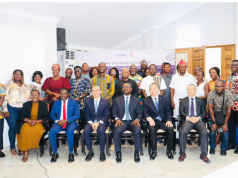Over 10,000 theatre enthusiasts last weekend and Monday, May 6, were at the Accra International Conference Centre to watch Ghanaian Playwright Latif Abubakar’s latest play ‘The License’.
Staged in partnership with the Embassy of Italy in Ghana, the play, which is an adaptation of celebrated Italian Novelist and Noble Prize Winner Luigi Pirandello’s novel, tells the story of Ademu who decides to take on the court through religion and tradition. It also explores themes of bureaucracy, absurdity and an individual’s struggle against oppressive systems.
Relying on religion and law, the play sought to address the supposed bureaucracies and difficulties associated with acquiring a Driver’s License and other relevant documents in the country. Characterised by comedy, music, dance and suspense, the play highlighted the consequences of possessing a fake driver’s license, as well as the right processes of acquiring one, including expedited services.
High patronage
The production saw a high patronage of over 10,000 patrons, with full houses for all five shows, including a Monday night show that recorded the highest turnout, while creating some 131 direct jobs.
In an interview, Mr. Abubakar, who had previously partnered the Embassy of Spain in Ghana to adapt and stage two Spanish plays into Afrocentric versions, said aside deepening the Italy-Ghana relationship beyond traditional trade, the partnership with the Embassy of Italy would help in promoting the exchange of culture between both countries; and once again set Ghana on another world stage.
The celebrated playwright, who is credited with hosting one of Africa’s biggest theatrical ventures ‘The Second Coming of Nkrumah’ with over 500 cast and crew which created about a 1000 direct and indirect jobs, said he remained committed to projecting Ghana’s theatre industry beyond the African continent.
“My team and I are deliberate about putting in stronger efforts for the mutual benefits of both parties and countries,” he stated. “While I look forward to many more exciting partnerships in the future, I want to specially commend the Italian Ambassador to Ghana, Madam Daniela d’Orlandi, whose initiative has resulted in this partnership,” he added.
Partnership
The Italian Ambassador to Ghana, Daniela d’Orlandi, said the partnership stemmed from the quality of plays from the camp of Mr. Abubakar. She said having witnessed the adaptation of two Spanish plays by Mr Abubakar, she was impressed by the quality of the performances. That, she said, encouraged her and the embassy to also partner the Playwright to promote Italian theatre and consequently, the Italian culture in Ghana.
Ms. d’Orlandi, who revealed that there would be direct flights from Ghana to Italy in the coming days, expressed excitement that for the first time in Ghana, the embassy was having an initiative in the theatre industry, noting that the collaboration between Ghana and Italy in the theatre industry was a move in the right direction. “I do hope that this will not be a one-time thing, but lead to many more partnerships,” she said.
Patrons experiences
Sharing his experience, Media Personality Abeiku Santana, who congratulated Latif Abubakar on partnering with the Embassy of Italy, said: “This collaboration is a testament to the power of theatre in bridging cultures and showcasing the richness of literature. Bold move to stage play on a Monday in Ghana is a statement that theatre knows no bounds,” he added.
For Heartwill Akpabli, who was watching a Latif Abubakar play for the first time, the play touched on some Ghanaian values and culture. “Even though it is an adaptation of an Italian novel, everything about it was Ghanaian; and that, for me, was awesome,” she said.
The License
First published in a newspaper in 1911, the play, which is being adapted into an Afrocentric version for the first time, originally touches on a series of familiar Pirandellian tropes that speak to the author’s realist interest in representing the actual ways in which law and social custom combine to limit and define the horizons of life for individuals, who are subject to the law.
Highlight
The play attracted over 10,000 patrons and created131 direct jobs.

















